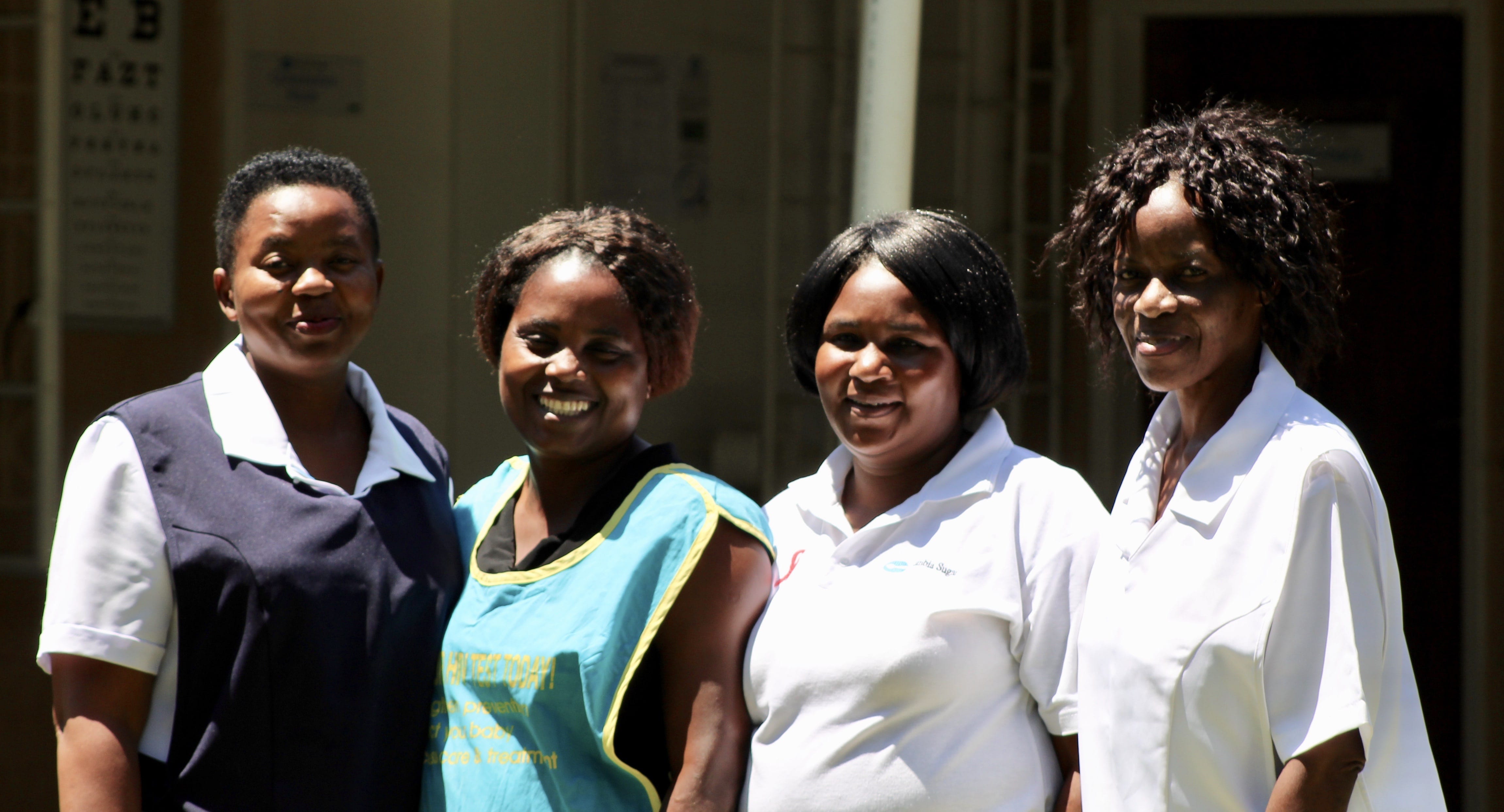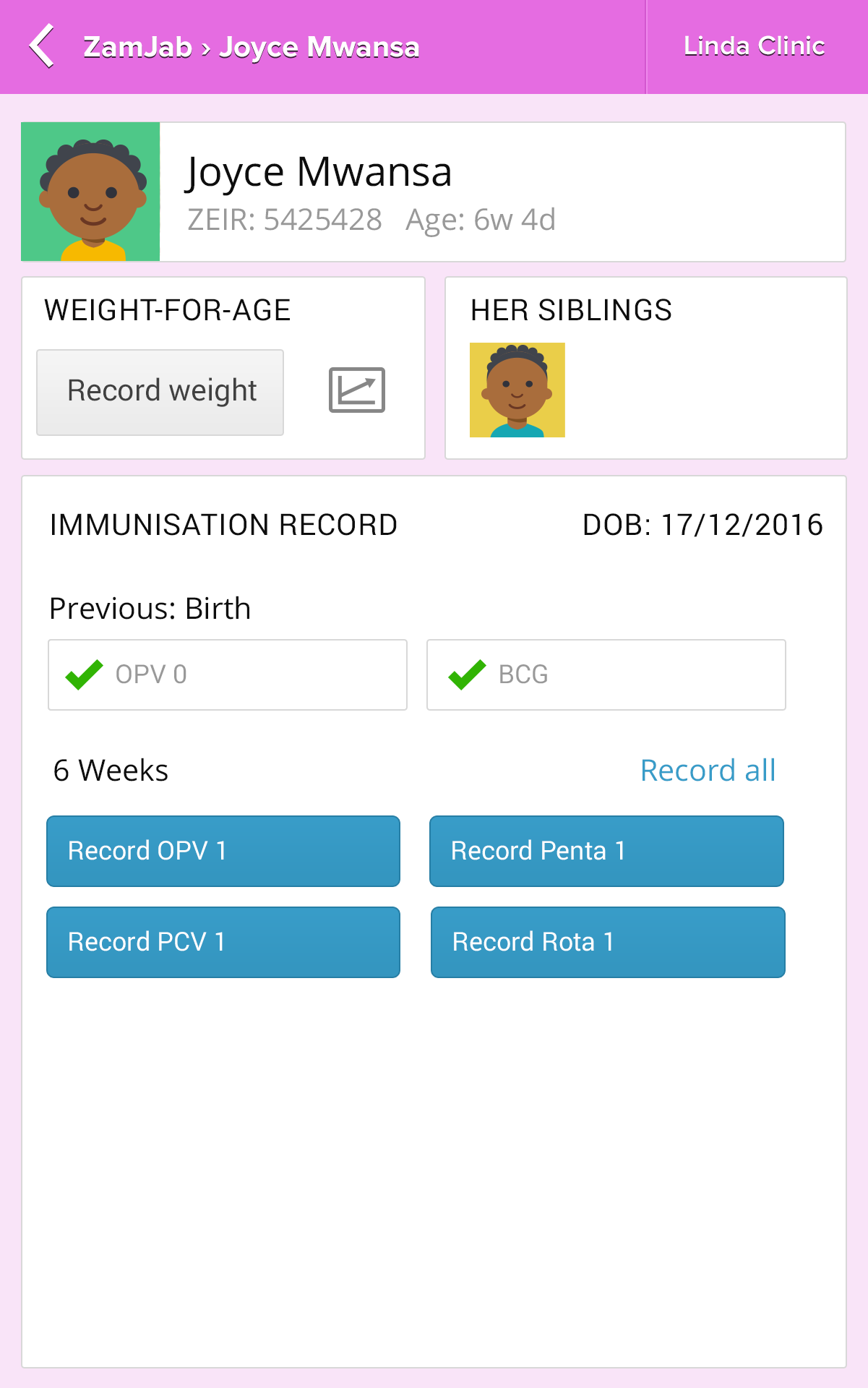Champions and super users: the health workers behind BID’s success
Ona is partnering with PATH and the Zambian Ministry of Health and local technology partner, BlueCode, to adapt OpenSRP to the vaccination workflows of health workers in Zambia’s Southern Province. We wrote earlier this year about the project, which is in support of the Better Immunization Data (BID) Initiative. We are excited to repost this article from Mali Kambandu, Communications Officer, BID Initiative Zambia, which sheds light on the impact the Zambia Electronic Immunization Registry (ZEIR) platform has had on health workers and what it means for them to use ZEIR in their interactions with clients. This article was originally posted on the BID Initiative blog:
 The MCH nurses at Nkabika Clinic. Photo: PATH/Mali Kambandu
The MCH nurses at Nkabika Clinic. Photo: PATH/Mali Kambandu
At the heart of the BID Initiative interventions are the health workers: men and women who are trained in data use interventions, and who work hard to adopt them, proving that improved data leads to improved decisions and thus better health outcomes for children in Zambia.
“With the ZEIR I can deliver better care.”
Georgina Muunga is a mother and child health nurse working at Linda Clinic in Livingstone. She has worked in the health service for seven years, and first became familiar with the data use interventions as we developed them with the Ministry of Health.
Linda Clinic serves 11,800 people with 420 babies coming for immunisations and growth monitoring each month. At the end of 2016, using the interventions became a reality for Sister Georgina and her colleagues. All 20 nurses in the Mother and Child Health department were trained on-site in the data use interventions and the Zambia Electronic Immunization Registry (ZEIR), and all staff are impressed by the effective interventions. Despite the challenges of working with dual systems, Sr. Georgina attributes the success of the data use interventions to the staff’s positive attitude and their willingness to embrace change.
“We were all happy to use this system because it helps us do our work better. It’s faster, so mothers spend less time at the registration table entering the baby’s data for that day,” said Sister Georgina. “This way, we can better serve the child. I spend a few minutes counselling the mother on child spacing and make sure she has come for her family planning. One of the best advantages with the ZEIR is that I have visibility into the babies’ siblings, and this helps me tailor my care to that mother. I cannot do that with the paper register.”

Users can easily view siblings’ records in ZEIR.
Sr. Georgina recently received an award for being “The Most Consistent User” at the BID Learning Network Discussion Meeting held in Lusaka in September. The award is well-deserved as her colleagues describe Georgina as a steadfast user of the interventions, making sure other users understood how to enter the data, troubleshooting when necessary, and encouraging those who might be afraid of adapting to the new methods.
“Too many books! That’s why we need to incorporate everything into one!”
Judy Chilema is a nurse/midwife who leads the diligent team of nurses at Nkabika Clinic in Mazabuka. She has practiced nursing for nineteen years and has been at Nkabika since 2013. A team of four nurses runs the children’s clinic at this private health centre which serves 12,302 people and has 250 to 300 children coming to the clinic for immunisations and growth monitoring every month. The four nurses were trained in the data use interventions and the ZEIR this past August, and were immediately keen on adopting the solutions to improve service delivery. Their enthusiasm for the new interventions led to a positive acceptance of the electronic devices in the community.
“It was important for all of us nurses to be trained with the tools because we all manage the children when they come for vaccines and growth monitoring. We took time to sensitise the mothers about the new tablet and what it was for,” explained Sister Judy. “Some came in specifically for their children to be registered! Some fathers came in with their wives to also understand what was happening, and this was good as it showed the whole family was taking an interest in the clinic’s services for their children.”
Sr. Judy reported that they had some challenges when first using the electronic system and getting used to all the functions, but the main challenge was dual data entry with the existing systems – nurses enter data into four registers, and also enter data into the mother’s postnatal card and the under-five card. “There are too many books! That’s why we need to incorporate everything into one. I’m looking forward to the time when we only have the ZEIR tablet!” said Sr. Judy.
The staff regularly refer to the electronic record whenever a child comes to the clinic, whether they come in for immunisation or not. The ZEIR is becoming an invaluable tool even beyond immunisation sessions. For instance, staff use it to get a good overall health snapshot of each child. If the child comes in for malaria or diarrhoea, they will still look at the ZEIR record to view the child’s other health indicators. As a result, staff can quickly move a child through the services, while paying close attention to the child’s needs.
The Nkabika community receives good health service delivery from this team of health workers, whose specialty seems to be the health education they provide to each mother and baby. A mother with a newly-born daughter said, “Today, my daughter was registered in the [ZEIR]. The nurse took time to inform me on what the tablet was for, what details she would need and why. I feel comfortable with it, and she answered all my questions.”
“I’m happy to enter children in the ZEIR for the very first time because I know they will be using this record for the coming five years! But above all, the ZEIR helps us work faster, and this will be important when we go for outreach,” said Sr. Judy.
Health workers like Srs. Judy and Georgina are what make the data use interventions a success, and their examples, along with many other super-users, will be carried forward as rollout continues in the remaining districts of Southern Province.

